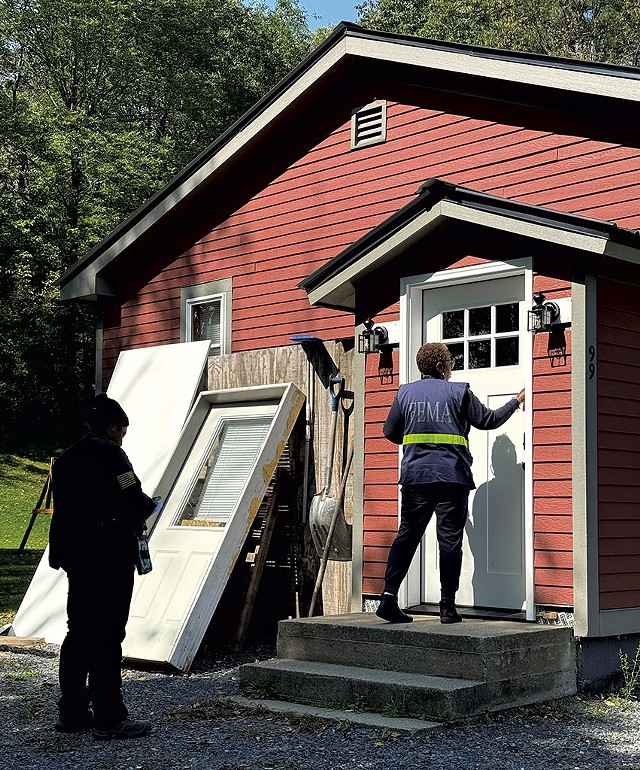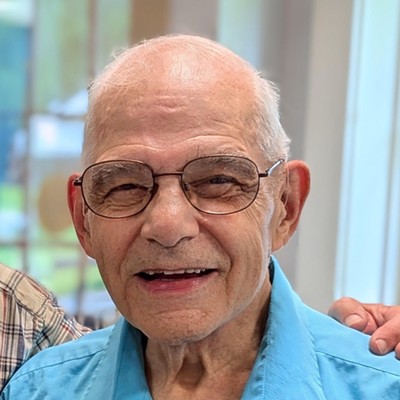
- Hannah Feuer
- Carmen Scott, left, and Helen Freeman from FEMA
"Good morning, FEMA!" a woman sporting a navy vest with a reflective yellow stripe called out on a recent Wednesday morning in Danville.
"Good morning, FEMA!" Carmen Scott repeated.
Although chickens were running around the front yard, it appeared that no one was home, so Scott and two colleagues piled back into their gray Nissan after tucking a bright orange informational flyer in the front door.
Across the state, employees from the Federal Emergency Management Agency, or FEMA, have been going door-to-door, speaking to Vermonters affected by the July flooding and helping them apply for financial assistance. Ten teams have been deployed in Addison, Caledonia, Chittenden, Essex, Lamoille, Orleans and Washington counties, where the deluge wreaked the most havoc.
As of mid-September, FEMA's Disaster Survivor Assistance teams had knocked on more than 12,000 doors. For an agency that has faced criticism for its unwieldy protocols, the idea is that face-to-face interactions will be most effective in demystifying the bureaucratic process.
"On the phone, people kind of miss things sometimes, and then if you do it on the computer, of course, you don't have an interaction with anyone," said Kimberly Fuller, a FEMA spokesperson who joined the three-member team going door-to-door in Danville because a Seven Days reporter was tagging along. "We want to be able to reach everybody."
The field staff has spoken with residents of about 5,500 homes, some of whom have received part of the roughly $4.7 million in individual assistance FEMA has approved for 1,458 households so far. The money helps to cover temporary housing, home repairs, and other costs such as food or medical expenses. Along with knocking on doors, FEMA has set up disaster recovery centers in Hinesburg, Island Pond, Lyndonville, Waterbury and Barre. In total, more than 200 FEMA employees are supporting the recovery effort in Vermont.
While officials emphasize the importance of face-to-face interactions, critics accuse the agency of overstaffing and administrative bloat. A recent Vermont Public investigation found that after the flooding in July 2023, FEMA spent $78.3 million in administrative costs to distribute about $43 million in assistance. Several victims told the radio station that they felt "mistreated and abandoned by the federal agency" and "struggled to get basic answers about applying for aid." Asked about the allegations — and whether the agency has worked to become more efficient — FEMA declined to comment.
In Danville, the FEMA team began in the parking lot of the Pope Memorial Library, where the crew members mapped out where they'd be going. Disaster Survivor Assistance teams start by visiting households that reported flood damage to the state-funded hotline Vermont 211 and asking residents to tell them about any additional damage.
The team included Scott, a 27-year-old from Atlanta, and 65-year-old Helen Freeman of Orange, Texas, plus Fuller and IT specialist Jason Nelson.
Scott has faint memories of FEMA helping her family during Hurricane Katrina when she was a child. Six years ago, she signed up to be a FEMA reservist — an on-call position that requires her to be available with 24-hour turnaround to deploy to disaster zones for at least 120 days of the year.
She's been sent to 16 natural disasters, including Vermont's flooding last year. The work can weigh on her, she said.
"It can be a tough job at times, especially because we never tell people you'll be back to normal," Scott said. "We'll always say, you know, 'We'll try our best to do the best we can for you. Put you on the road to recovery.'"
The crews started work in Vermont within hours of President Joe Biden declaring the flooding a major federal disaster on August 20, and they expect to finish door-to-door canvassing in early October. Individual workers can be deployed for a maximum of 50 weeks, and it's not always clear when their mission will end. "As long as Vermont needs us, we're here," said Scott, who had been in Vermont for two weeks at the time of the interview.
The team goes above and beyond to reach people, Fuller said, driving down Class 4 roads "that we might not have thought were roads," and walking long distances when parking isn't an option, often in areas without cell service. Their car is equipped with Starlink satellite internet, providing Wi-Fi access to anyone within 200 feet of the vehicle, which helps the FEMA workers access GPS and gives flood victims the connectivity needed to download the agency's app.
A boots-on-the-ground operation is crucial for delivering assistance where it's needed most, Fuller said, adding that a culture of Yankee stoicism means people sometimes require extra encouragement to seek help.
"A lot of people just are very independent, and they'll tell us the minute we go up, 'Oh, we don't ask the government for any money,'" she said. "But when you start seeing your neighbors come home with supplies to repair their house because FEMA funded it, then you start seeing people have a little bit more interest in the process."
Another challenge is catching people when they're home. No one answered the door at five out of six houses FEMA visited on the morning Seven Days came along. The teams often find themselves circling back to places they've already tried, working 12-hour days, seven days a week to reach as many people as possible.
The one person who did answer their knock was Wanda Parrish, 68, who still lives in the same house in Danville where she grew up — a modest single-family home with bright blue garage doors and an American flag hanging from the front porch. Her father built the house himself in 1965.
But her father never imagined that what was once one of the house's selling points — its location on the Sleepers River — could become a liability. When the river flooded in July 2023, it eroded a chunk of Parrish's land and left debris scattered in her backyard. Just a year later, the river flooded again, washing away more of her property.
Despite the damage, Parrish didn't seek financial assistance.
"I just figured there's other people that have got much worse problems than I do," she said. "We either have to pay ourselves to get it fixed or, you know, let it go for now."
She didn't bother filing an insurance claim, assuming it would be denied.
That is, until this month, when the federal team knocked on her door. Fuller, citing privacy concerns, didn't let a Seven Days reporter listen in on the conversation.
Later, Parrish told Seven Days that the FEMA workers informed her that to qualify for federal assistance she would need to file an insurance claim — if only to obtain proof of denial. By law, the agency can't cover expenses already addressed by insurance. The team also clarified that FEMA aid isn't zero-sum; what she receives won't affect how much her neighbors can get.
"You can see the lengths that [we] go to get the interaction," Fuller said. "There's a human being that can actually listen. We find part of the healing process is for people to tell their story."
Now, thanks to that conversation with FEMA, Parrish said she plans to apply for financial relief.










Comments
Comments are closed.
From 2014-2020, Seven Days allowed readers to comment on all stories posted on our website. While we've appreciated the suggestions and insights, right now Seven Days is prioritizing our core mission — producing high-quality, responsible local journalism — over moderating online debates between readers.
To criticize, correct or praise our reporting, please send us a letter to the editor or send us a tip. We’ll check it out and report the results.
Online comments may return when we have better tech tools for managing them. Thanks for reading.